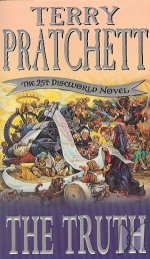
The Truth
Terry Pratchett
319 pages
published in 2000
I had forgotten how good this was. The Truth is the twenty-fifth Discworld novel and before publication was hyped as being the first Discworld novel in years not to fit in any of the well established subseries. All of which may have worked in its disadvantage, as I seem to remember that at the time it came out, many people were somewhat disappointed in it. I myself quite liked it, but no more so than any other discworld novel.
It is only now, after having read it for a second time that I realised how good it actually is. The best of Pratchett's Discworld novels have always worked on several levels: as a entertaining story, a humourous rewrite of real world developments and as satire. The Truth succeeds on all these levels.
The Discworld series started out as simple parodies, before moving into satire, but from about Maskerade onwards, Pratchett seemed to have moved his focus more towards development of the Discworld itself and in particular the city of Ankh-Morpork, one of the great fantasy creations. In The Truth Ankh-Morpork again takes centre stage, when we learn what it means exactly to be the largest trade, business and industrial town in the world --a lot of trades depend on not very savoury stuff for their raw materials and how these things are gathered, bought and sold is an integral part of the story, if not of its plot.
Because its plot is not very original for a Discworld book. Once again the Patrician is overthrown, this time accused of a heinous crime, but in fact the victim of a hidden complot which wants to rule the city in his stead. But this time the hero who has to uncover the complot isn't Vimes, or any other well known Pratchett hero, but one William DeWorde, younger son of an old established aristocratic family, somewhat of a family failure, earning his keep by writing letters about interesting happenins in Ankh-Morpork for high muckamucks abroad, that is until he runs into a gang of dwarfs with the Discworld's first printing press.
So while the plot may be about DeWorde uncovering the conspiracy to dethrone the patrician, with the usual subplots about the progress-resistant Ankh-Morporkian elites (priests, wiz(z)ards and the like) and the far more novelty-embracing Morporkian Great Unwashed coming to terms with printing as well as the first newspaper as started by DeWorde, the story is about the power of the press, truth as well as societal conflicts between the old aristocracy and the new industrial tycoons.
Pratchett's intentions with this book may be summed up in the following quote from early in the book, even though The Truth is too rich a book to condens that way entirely:
"Kings and lords come and go and leave nothing but statues in a desert, while a couple of young men tinkering in a workshop change the way the world works."
What The Truth did was to show how that change happens, but far more entertaining than this review may lead you to believe. I haven't even mentioned the Quentin Tarantino pisstake Prachett put in it, after all.
